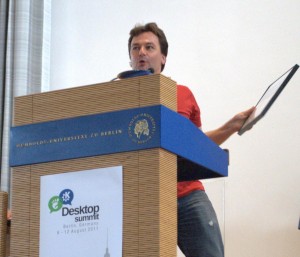Originally from Manchester, UK, Paul Boddie moved to Oslo in 1998 after living in France. Paul has been working with Python since 1995, and from 2006 to 2010 was involved in organising the annual EuroPython conference, administering various conference-related tools and developing the conference website.
He is also a MoinMoin theme and extension developer and, after joining FSFE in 2008, created the EventAggregator extension to allow management of FSFE events from within the wiki, and also developed the current FSFE Wiki theme. His other projects include a variety of Python-related tools, with a special interest in alternative Python implementations.
Chris Woolfrey: What are you working on at the moment?
Paul Boddie: I’m writing applications that access and combine databases in the bioinformatics domain, although I also have an ongoing project dealing with the text-mining of biological and medical literature to extract gene and protein-related information. I also have a fair amount to do in terms of maintaining and hopefully developing further some software written in the group in which I work. We have to make the work available, so there’s a need to publish information on the web. It ends up as a mix of software development, some maintenance tasks, and a degree of web publishing and content management.
I’m working on a range of personal projects, too, which includes things like the EventAggregator that is used on the FSFE Fellowship Wiki, a selection of MoinMoin-related extensions (which is why I was able to get involved a bit more with the Fellowship Wiki) and some longer term interests in things like source code analysis and compilation for dynamic programming languages like Python.
The EventAggregator has been an interesting project. The reason why it got there is because the administrators were looking for a calendar solution, and it just didn’t seem that they had found anything suitable. There are some WordPress solutions, but there seemed to be some caveats involved with them, and there are some MoinMoin solutions, but they were fairly simple personal calendar solutions. The only one that’s more sophisticated doesn’t appear to be well maintained.
I think that the administrators wanted something that integrated with the existing applications instead of having to deploy something else. If they were choosing something now, maybe they might have gone with GriCal whose principal developer I have collaborated with in order to have the Wiki calendar show events registered on grical.org, a calendar service oriented towards Free Software.
I suppose this highlights a difference between the Fellowship and, say, the Python community. The latter would probably have chosen the more “pragmatic” Google Calendar option, which I think is widely used on the Python website for various things. But then that would mean that you lose control over the user experience (which is awful considering those calendar widgets that you can embed in your website), and you also lose control over storage and integration. Developing EventAggregator has been interesting, but it hasn’t primarily been for my personal benefit, even though I find it useful and satisfying to see it used by other people. I think that taking control over an activity by developing software for it, especially when you can decide what it does and how it should work, is the right thing to do. Ultimately, that is also the correct “pragmatic” decision.
My work is done almost completely using Free Software. I’m fortunate enough to be in an environment where people understand what systems like GNU/Linux offer, and where I can choose the tools I want to use. And there is definite encouragement for people to choose Free Software tools instead of demanding proprietary software licenses for everything. When I worked at CERN in administration, it was wedded to a range of proprietary solutions, where Free Software often had to be the lubricant to make the wheels turn.
CERN…was wedded to a range of proprietary solutions, where Free Software often had to be the lubricant to make the wheels turn
CW: How did you get involved with Free Software in the first place?
PB: I probably started using Free Software in earnest around the time I was studying Computer Science at Heriot-Watt University, mostly because the tools being used were frequently Free Software. Although the computing environment was heterogeneous – DEC workstations running Ultrix (and later OSF/1), HP workstations running HP-UX, Sun machines running SunOS, and so on – there was no way that a university department was going to pay lots of money for things like compilers, and so everyone was using gcc. And I suppose that brought in other tools that we take for granted.
So it was a bit like many people’s first experience of Free Software: there are proprietary systems, but the Free tools are the ones you end up using for various reasons. This has come back again and again in my career. I think that one starts off being only vaguely conscious of Free Software, what it is and why it was made, and then develops a greater awareness of those things.
CW: Was your involvement the result of technical needs?
PB: Well, I started university being enthusiastic about Acorn Computers’ ARM-based microcomputers, which were rather proprietary and where the tools were generally not free (or Free), but where the user interface was very nice. But after a while, I became more aware of technologies like Tcl/Tk which really put the tools available for the supposedly superior RISC OS environment to shame. And there were people who wanted to have the full package on RISC OS but found that the Tk part was too hard to port.
So there was a big contrast between the proprietary universe of RISC OS supported by a struggling platform vendor with people selling mediocre tools for various sums of money and the non-proprietary universe of, or on top of, Unix with its portable and impressive tools that made up for various shortcomings of the user interface.
I think my university experience was influential in exposing me to a wide selection of tools, most of which were Free Software. Eventually, I’d seen and at least dabbled with things like Tcl/Tk, Perl (although I learned that at CERN), Python, and Java (which obviously wasn’t Free Software at the time).
lots of people just try to brush the political aspect aside as “ideology”, using the word in a derogatory sense
CW: Has your involvement with Free Software become more political over the years?
PB: It is a political thing for me now, yes. When discussing Free Software with people, lots just try to brush that aspect of it aside as “ideology”, using the word in a derogatory sense, but many of them don’t understand the problems with proprietary software and platforms, perhaps because they haven’t had enough bitter experiences with those things yet.
Again, I think that my interest was motivated initially by convenience; there were lots of great tools that you didn’t need to ask anyone’s permission to use, but developed a bit after being exposed to the dynamics of developing and distributing Free Software, and also being reminded of the pitfalls of proprietary solutions.
I suppose that using a proprietary platform that has more or less disappeared can be instructive. A lot of people don’t give a second thought to things like document longevity (or “document freedom” as it is sometimes known), and perhaps even aren’t aware of the issues – if you save your Microsoft Word document with the latest version of Microsoft Word, and if everyone else has that version, then the attitude is “what’s the problem?”. But it’s only due to my brother’s experiments with various proprietary formats that that I am able to actually read various files I authored in the 1990s.
I’m sure many people just regard their old work as disposable or not so important, at least where things like textual documents are concerned, and given the slightly more powerful than average solution I was using back in that era, maybe I’m more sensitive to the issue because there’s a large amount of creative input to those works: things like diagrams and pictures that I spent time on as well as the actual text, although I’d hope that many people’s plain text documents would be valuable to them, such as their university degree thesis, for example.
But I suppose there is a personal archive quality to it: how many people would tolerate not being able to view their photographs after only a couple of decades? I think that data preservation is a good way of explaining the benefits of Free Software because it leads to the next realisation: that of sustainable computing and being able to maintain the ability to use, maintain and develop solutions indefinitely.
pragmatism should encompass notions of sustainability
CW: And the idea of sustainability is what might be called the political element?
PB: Well, there’s the distinction that is often made between “pragmatic” and “ideological” reasons for using Free Software, with the “open source” label being used more with the former term, and the intent that people are trying to express with the “pragmatic” label is that they just choose something that does the job at the time, and if something better comes along then they’ll use that instead.
Working like that is supposed to be outside any political sphere because one is supposedly not acting according to some kind of moral code: the merits of each solution are supposedly evaluated in an objective and immediate way. But one can argue that pragmatism should encompass notions of sustainability (which are regarded as political) because the supposedly “pragmatic” approach considers only what is best in the short term and ignores issues that might arise in the longer term. It is still pragmatic to consider one’s own long-term interests.
I think we all know of cases where a “pragmatic” solution was chosen that wasn’t in the long-term interests of those who made that decision.
CW: You mean there’s an inherent “good” in using Free Software and you’re happy to promote that?
PB: I think that although it is often said that Free Software is empowering, it isn’t always made explicit that it is essentially a means of providing people with control over their work, their tools, and these days over large parts of their lives. It is about giving the control to people who don’t usually have it. As I said before, I think it takes time for people to realise this after having been initially exposed to Free Software, but perhaps I was just slow on the uptake.
CW: You’ve volunteered at, and hacked for, a lot conferences and meet-ups. Can you expand on how that atmosphere is or isn’t a good way of promoting Free Software?
PB: I’ve been involved with the European Python community conference, EuroPython, and have been using Python since 1995. That was mostly a matter of having a very usable, convenient tool to do my university degree project. Since that time, I’ve gradually become more involved with writing Python code, improving other people’s Python-related code, and then sharing Python code with others.
Since Python is Free Software, I think that my general community involvement has made me very aware of many of the issues that we’ve already discussed. After a while, you get to see how projects are formed, developed, promoted, and so on. And Python conferences have quite a lot to do with promoting Python as a Free Software tool, partly by supporting users of the language and software, and partly by just increasing the visibility of the technology.
It’s no accident that I got involved with EuroPython when it went to CERN in 2006. It gave me an opportunity to go back to my former workplace and promote Python when in my job it had actually been somewhat difficult to get Python adopted in any significant way, which was disappointing given the restrictive and inferior nature of some of the tools being used. In fact, the scientific community at CERN have adopted Python quite aggressively since I worked there, and even parts of the administrative side of the organisation were using Python for their systems.
But with regard to promoting Free Software, I think there’s something of a divide in the Python community between promoting Python as Python and promoting Python as Free Software. Some people are quite happy to promote proprietary solutions that use Python because to them this means that Python gets a larger audience (although it is frequently a dubious claim, in my mind), whereas other people would rather developers used a Free Software solution that isn’t Python in preference to a Python-based solution that is proprietary (and I can say that I’m in that crowd).
So, Python conferences are a good way of promoting Python, but they don’t seem to necessarily be about promoting Free Software in general. Then again, I know that when EuroPython was organised in the UK in 2009 and 2010, John Pinner, who was the chief organiser – and who does a lot of work for Python and Free Software – seemed to want more of a Free Software emphasis on the event; although that didn’t mean excluding people who wanted to promote Python-based proprietary products.
In general, I think people get more out of talks that present Free Software because the threshold to adoption, experimentation and involvement is a lot lower than if someone gets up and talks about a proprietary product. In a way, that convenience aspect that drew me into using Free Software solutions remains a very potent force.
CW: That’s the pragmatic thing again right? It’s almost like you’re saying that you don’t need to promote FS – it promotes itself…
PB: To the right audience I think it does, yes.
CW: But do these conferences find that audience?
PB: Whether you find the right audience depends a lot on publicity. I think that a lot of people who choose to go to a community conference like EuroPython are likely to be enthusiasts for the technology, and they are perhaps likely to be in favour of Free Software, too. Community conferences are quite “barebones” affairs, really: there isn’t much in the way of merchandise, swag, free stuff, but then the ticket price is relatively low.
In contrast, commercial conferences have a higher ticket price, may well have most of the attendees being sponsored by their employers, and the motivation (or excuse) for going might be that it will help you in your job, even if it’s just to get away from the office for a few days.
An important distinction that came up when EuroPython was trying to find people to volunteer was that between attendees and participants. You need people to actually participate, not just attend and expect the experience to be comfortable, smooth, problem-free. That culture of participation, rather than expecting everything to be done for you, may well also attract people who use Free Software because of the culture of participation.
That said, I think that when EuroPython was held in the UK, the demographic might have been slightly different to when it was held in other countries. In the UK, people seem to be quite focused on how they might use Python in their workplace, and the whole collaborative development aspect seemed to be relatively new to some of the participants. I hope that the benefits of Free Software collaboration reached a wider audience and that people got to feel that the barriers to participating aren’t as big as they might expect.
CW: Might event management show, in itself, the benefits of Free Software? Is an event managed using Free Software going to turn about better than one that isn’t?
PB: Organising conferences? That’s a huge topic that I could probably talk about for hours! On the subject of using Free Software to organise conferences, I think that the initial decision people make when planning a conference in general is whether they involve a commercial operator or do it themselves. However, unless you’re expecting a huge number of people or don’t have the time to plan things yourself, you’re likely to avoid the commercial option as I have heard that it can be very expensive.
So, once you’ve decided to do it yourself, you can look around at the different activities and how you might handle them. There are Web-based solutions for a lot of these things, some being software-as-a-service and proprietary, others being run as a service but where you could choose to host the software yourself.
There’s a lot of choice and a lot of adequate Free Software solutions, so I don’t think there’s a really good reason not to choose one of them. But that doesn’t mean that all the work is done once you’ve made that choice, of course!
Yes, I think FS works very well. In a sense we’re spoiled for choice, but in the famous tradition of Free Software, that doesn’t mean that people aren’t creating even more solutions because there’s something they don’t like about the ones already out there.
Maybe the biggest challenge in terms of raw software is the interface to payment services, which are obviously proprietary and unfriendly beasts – or that’s how they seem to me. But there are plenty of people working with (or against) these things, so the more significant problem is perhaps the nature of those services themselves, and that’s a completely different concern.
There are a lot of people who have problems even using PayPal to make payments: the service stops liking your card details or your account information and you get stuck in an endless re-authentication loop. There are also a lot of people who don’t trust PayPal with their money. Meanwhile, other payment services are about as helpful as the average bank.
interfaces to payment services, which are proprietary and unfriendly beasts, is one of the biggest challenges
CW: What about BitCoin?
I think there are huge trust and credibility issues with BitCoin, sadly. But there are apparently alternative payment services out there that are as easy to adopt as PayPal, so it’s just a matter of using them. And again, it’s easy to get hung up on matters like this, but one effective means of taking registration payments is bank transfers. If you are only dealing with people from countries whose banks don’t regard you as being insane when you ask to make a transfer to someone else’s account, especially in another country, then just accepting bank transfers is a viable option.
Sadly, when involving the UK, people want other payment methods because the banks like to overcharge for simple things like transfers. Even Norwegian banks offer “single payment area” rates for transfers, and Norway isn’t even in the EU, let alone a country with the Euro as its currency.
I have to say that conference organisation is, to a large extent, about dealing with matters without letting them consume everything else. It can be very easy for good-enough solutions to be discussed at length in an attempt to make them perfect solutions, and there are plenty of areas providing opportunities for such discussions.









